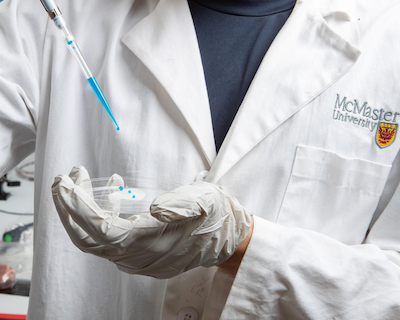
Non-stick coating repels drug-resistant superbugs
By DE Staff
General MedicalMcMaster researchers create hydrophobic plastic wrap designed for medical and food industry applications.

A plastic wrap developed by researchers at McMaster University repels everything that comes into contact with it, including viruses and bacteria. (Credit: Georgia Kirkos, McMaster University)
The new plastic surface – a treated form of conventional transparent wrap – can be shrink-wrapped onto door handles, railings, IV stands and other surfaces that can be magnets for bacteria such as MRSA and C. difficile. The treated material is also suited for food packaging, where it could stop the accidental transfer of bacteria such as E. coli, Salmonella and listeria from raw chicken, meat and other foods.
The research was led by engineers Leyla Soleymani and Tohid Didar, who collaborated with colleagues from McMaster’s Institute for Infectious Disease Research and the McMaster-based Canadian Centre for Electron Microscopy.
Inspired by the water-repellent lotus leaf, the hydrophobic surface works through a combination of nano-scale surface engineering and chemistry. The surface is textured with microscopic wrinkles that repel liquids and is treated chemically to further enhance its repellent properties, resulting in a barrier that is flexible, durable and inexpensive to reproduce, the researchers say.
“We can see this technology being used in all kinds of institutional and domestic settings,” Didar says. “As the world confronts the crisis of anti-microbial resistance, we hope it will become an important part of the anti-bacterial toolbox.”
The researchers tested the material using two of the most troubling forms of antibiotic-resistant bacteria: MRSA and Pseudomonas, with the collaboration of Eric Brown of McMaster’s Institute for Infectious Disease Research. According to a paper recently published in the journal ACS Nano, the plastic wrap reduced biofilm formation of MRSA and Gram negative Pseudomonas by 87 and 84%, respectively.
The research team is currently looking for a partner to develop commercial applications for the wrap.
www.mcmaster.ca
